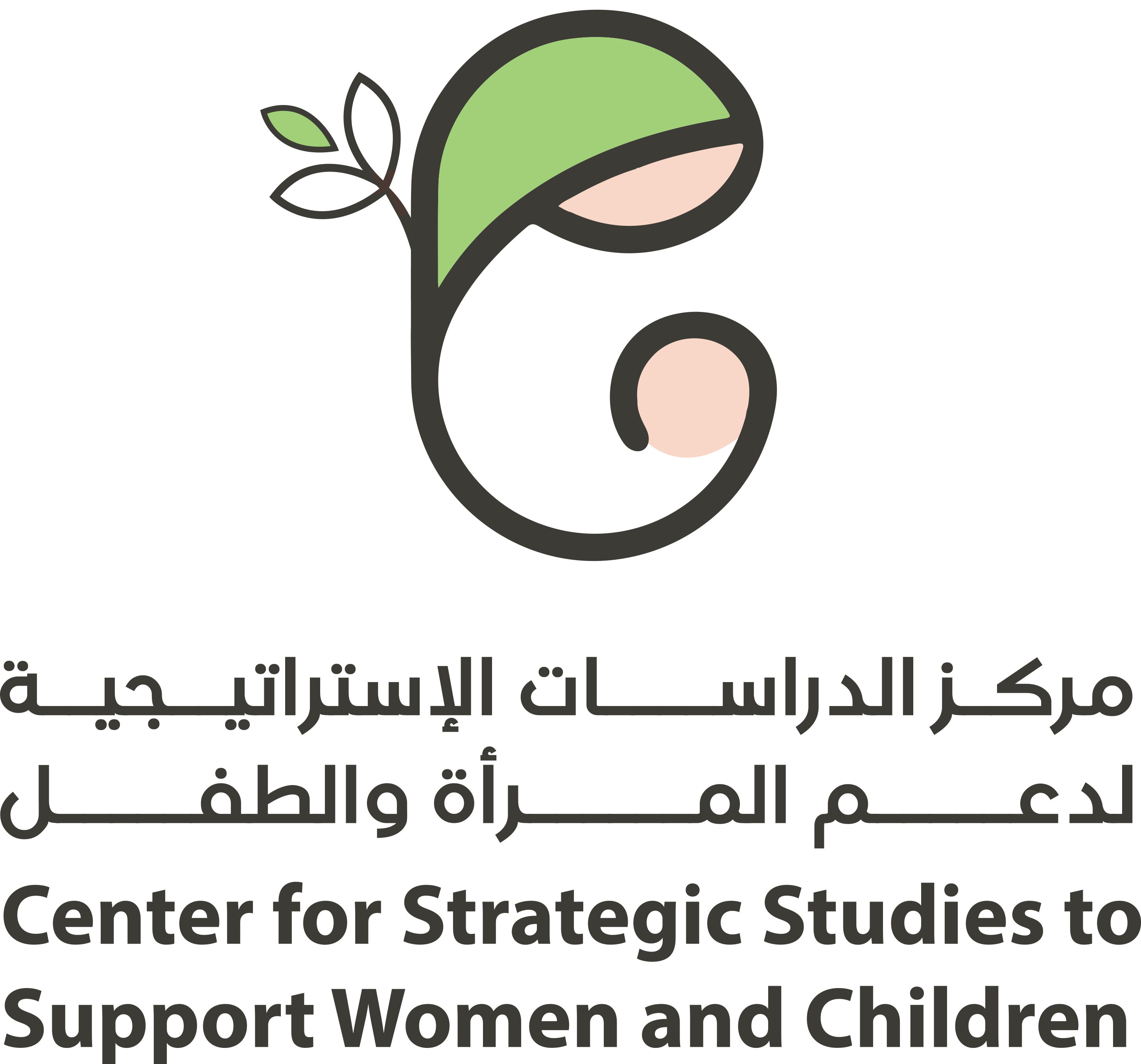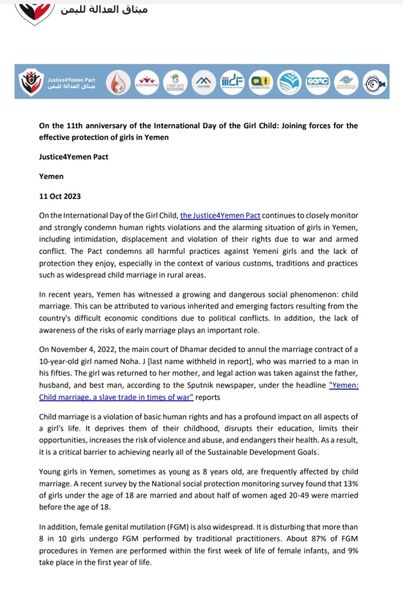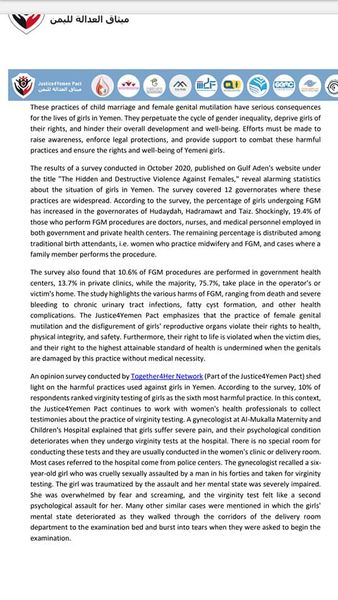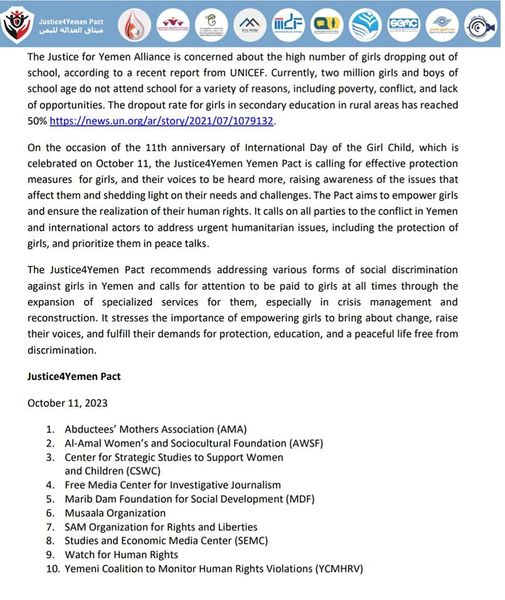In the Occasion of #International_Day_of_The_Girl_Child, Justice for Yemen Pact Coalition Releases a statement, “The eleventh anniversary of the International Day of the Girl: Joining forces to achieve effective protection for girls in Yemen.”
On the International Day of the Girl Child, the Justice4Yemen Pact continues to closely monitor
and strongly condemn human rights violations and the alarming situation of girls in Yemen,
including intimidation, displacement and violation of their rights due to war and armed
conflict. The Pact condemns all harmful practices against Yemeni girls and the lack of
protection they enjoy, especially in the context of various customs, traditions and practices
such as widespread child marriage in rural areas.
In recent years, Yemen has witnessed a growing and dangerous social phenomenon: child
marriage. This can be attributed to various inherited and emerging factors resulting from the
country's difficult economic conditions due to political conflicts. In addition, the lack of
awareness of the risks of early marriage plays an important role.
On November 4, 2022, the main court of Dhamar decided to annul the marriage contract of a
10-year-old girl named Noha. J [last name withheld in report], who was married to a man in
his fifties. The girl was returned to her mother, and legal action was taken against the father,
husband, and best man, according to the Sputnik newspaper, under the headline "Yemen:
Child marriage, a slave trade in times of war" reports
Child marriage is a violation of basic human rights and has a profound impact on all aspects of
a girl's life. It deprives them of their childhood, disrupts their education, limits their
opportunities, increases the risk of violence and abuse, and endangers their health. As a result,
it is a critical barrier to achieving nearly all of the Sustainable Development Goals.
Young girls in Yemen, sometimes as young as 8 years old, are frequently affected by child
marriage. A recent survey by the National social protection monitoring survey found that 13%
of girls under the age of 18 are married and about half of women aged 20-49 were married
before the age of 18.In addition, female genital mutilation (FGM) is also widespread. It is disturbing that more than
8 in 10 girls undergo FGM performed by traditional practitioners. About 87% of FGM
procedures in Yemen are performed within the first week of life of female infants, and 9%
take place in the first year of life.
and strongly condemn human rights violations and the alarming situation of girls in Yemen,
including intimidation, displacement and violation of their rights due to war and armed
conflict. The Pact condemns all harmful practices against Yemeni girls and the lack of
protection they enjoy, especially in the context of various customs, traditions and practices
such as widespread child marriage in rural areas.
In recent years, Yemen has witnessed a growing and dangerous social phenomenon: child
marriage. This can be attributed to various inherited and emerging factors resulting from the
country's difficult economic conditions due to political conflicts. In addition, the lack of
awareness of the risks of early marriage plays an important role.
On November 4, 2022, the main court of Dhamar decided to annul the marriage contract of a
10-year-old girl named Noha. J [last name withheld in report], who was married to a man in
his fifties. The girl was returned to her mother, and legal action was taken against the father,
husband, and best man, according to the Sputnik newspaper, under the headline "Yemen:
Child marriage, a slave trade in times of war" reports
Child marriage is a violation of basic human rights and has a profound impact on all aspects of
a girl's life. It deprives them of their childhood, disrupts their education, limits their
opportunities, increases the risk of violence and abuse, and endangers their health. As a result,
it is a critical barrier to achieving nearly all of the Sustainable Development Goals.
Young girls in Yemen, sometimes as young as 8 years old, are frequently affected by child
marriage. A recent survey by the National social protection monitoring survey found that 13%
of girls under the age of 18 are married and about half of women aged 20-49 were married
before the age of 18.In addition, female genital mutilation (FGM) is also widespread. It is disturbing that more than
8 in 10 girls undergo FGM performed by traditional practitioners. About 87% of FGM
procedures in Yemen are performed within the first week of life of female infants, and 9%
take place in the first year of life.
These practices of child marriage and female genital mutilation have serious consequences
for the lives of girls in Yemen. They perpetuate the cycle of gender inequality, deprive girls of
their rights, and hinder their overall development and well-being. Efforts must be made to
raise awareness, enforce legal protections, and provide support to combat these harmful
practices and ensure the rights and well-being of Yemeni girls.
The results of a survey conducted in October 2020, published on Gulf Aden's website under
the title "The Hidden and Destructive Violence Against Females," reveal alarming statistics
about the situation of girls in Yemen. The survey covered 12 governorates where these
practices are widespread. According to the survey, the percentage of girls undergoing FGM
has increased in the governorates of Hudaydah, Hadramawt and Taiz. Shockingly, 19.4% of
those who perform FGM procedures are doctors, nurses, and medical personnel employed in
both government and private health centers. The remaining percentage is distributed among
traditional birth attendants, i.e. women who practice midwifery and FGM, and cases where a
family member performs the procedure.
The survey also found that 10.6% of FGM procedures are performed in government health
centers, 13.7% in private clinics, while the majority, 75.7%, take place in the operator's or
victim's home. The study highlights the various harms of FGM, ranging from death and severe
bleeding to chronic urinary tract infections, fatty cyst formation, and other health
complications. The Justice4Yemen Pact emphasizes that the practice of female genital
mutilation and the disfigurement of girls' reproductive organs violate their rights to health,
physical integrity, and safety. Furthermore, their right to life is violated when the victim dies,
and their right to the highest attainable standard of health is undermined when the genitals
are damaged by this practice without medical necessity.
An opinion survey conducted by Together4Her Network (Part of the Justice4Yemen Pact) shed
light on the harmful practices used against girls in Yemen. According to the survey, 10% of
respondents ranked virginity testing of girls as the sixth most harmful practice. In this context,
the Justice4Yemen Pact continues to work with women's health professionals to collect
testimonies about the practice of virginity testing. A gynecologist at Al-Mukalla Maternity and
Children's Hospital explained that girls suffer severe pain, and their psychological condition
deteriorates when they undergo virginity tests at the hospital. There is no special room for
conducting these tests and they are usually conducted in the women's clinic or delivery room.
Most cases referred to the hospital come from police centers. The gynecologist recalled a six-
year-old girl who was cruelly sexually assaulted by a man in his forties and taken for virginity
testing. The girl was traumatized by the assault and her mental state was severely impaired.
She was overwhelmed by fear and screaming, and the virginity test felt like a second
psychological assault for her. Many other similar cases were mentioned in which the girls'
mental state deteriorated as they walked through the corridors of the delivery room
department to the examination bed and burst into tears when they were asked to begin the
examination.
The Justice for Yemen Alliance is concerned about the high number of girls dropping out of
school, according to a recent report from UNICEF. Currently, two million girls and boys of
school age do not attend school for a variety of reasons, including poverty, conflict, and lack
of opportunities. The dropout rate for girls in secondary education in rural areas has reached
50% https://news.un.org/ar/story/2021/07/1079132.
On the occasion of the 11th anniversary of International Day of the Girl Child, which is
celebrated on October 11, the Justice4Yemen Yemen Pact is calling for effective protection
measures for girls, and their voices to be heard more, raising awareness of the issues that
affect them and shedding light on their needs and challenges. The Pact aims to empower girls
and ensure the realization of their human rights. It calls on all parties to the conflict in Yemen
and international actors to address urgent humanitarian issues, including the protection of
girls, and prioritize them in peace talks.
The Justice4Yemen Pact recommends addressing various forms of social discrimination
against girls in Yemen and calls for attention to be paid to girls at all times through the
expansion of specialized services for them, especially in crisis management and
reconstruction. It stresses the importance of empowering girls to bring about change, raise
their voices, and fulfill their demands for protection, education, and a peaceful life free from
discrimination.
Justice4Yemen Pact
October 11, 2023
1. Abductees’ Mothers Association (AMA)
2. Al-Amal Women’s and Sociocultural Foundation (AWSF)
3. Center for Strategic Studies to Support Women
and Children (CSWC)
4. Free Media Center for Investigative Journalism
5. Marib Dam Foundation for Social Development (MDF)
6. Musaala Organization
7. SAM Organization for Rights and Liberties
8. Studies and Economic Media Center (SEMC)
9. Watch for Human Rights
10. Yemeni Coalition to Monitor Human Rights Violations (YCMHRV)
The statement is Available via the following link



